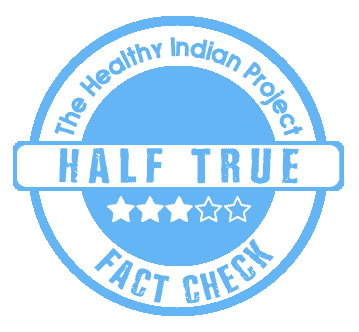Last Updated on December 11, 2023 by Neelam Singh
Quick Take
A social media video advises against popping a blister, claiming that the liquid inside serves as a protective skin barrier. This liquid safeguards the area until it heals. The video claims that by popping a blister, the skin becomes exposed once more. Upon fact-checking, we discovered the claim to be half true.

The Claim
A Facebook video advises against popping blisters, asserting that the fluid within acts as a natural skin barrier, safeguarding the underlying skin until it heals. The video suggests that popping a blister exposes the skin before it is healed completely.
We have attached a screenshot of the post below:

Fact Check
What is a blister?
A blister is a small pocket of fluid that forms within the upper layers of the skin. It typically appears as a raised bump and is filled with a clear fluid, although it can also contain blood or pus depending on the cause.
What are the types of blisters?
There are various types of blisters, including:
- Friction blisters: They are caused by friction or rubbing on the skin, often due to ill-fitting shoes or repetitive pressure.
- Burn blisters: They result from heat, electricity, sunlight, or chemical burns, categorized by their depth into superficial, partial thickness, or full thickness burns.
- Blisters associated with eczema: Dyshidrotic eczema can cause small, itchy blisters on the hands or feet during flare-ups.
- Blisters due to viral infections: They result from infections like chickenpox, shingles, or herpes simplex virus (cold sores).
- Heat blisters: They occur due to burns, sunburns, or skin warming after frostbite.
- Blisters related to health conditions: They can occur due to diseases, infections, or allergies. For example, Herpes simplex virus type 1 (HSV-1) can cause fever blister.
Why is there a debate on popping blisters?
Popping a blister can be a topic of discussion due to the potential risks and benefits associated with it. Here are some reasons why there’s significant discourse around this issue:
- Infection risk: The primary concern is the risk of infection. Blisters act as a natural barrier against bacteria and dirt, protecting the underlying skin from infection. Popping a blister prematurely can expose the raw skin beneath to potential infection if proper hygiene measures are not followed.
- Pain and discomfort: Blisters can be painful and uncomfortable, especially if they are in areas that experience friction or pressure. Some people may consider popping them to reduce pain or to enable continued daily activity.
- Healing process: Popping a blister can interfere with the body’s natural healing process. The fluid within a blister serves as a cushion, promoting healing by protecting the raw skin underneath. Breaking this protective barrier may slow down the healing process or increase the likelihood of scarring.
- Professional recommendations: Healthcare professionals often debate the necessity of popping blisters. Some may recommend leaving them intact if they are small, clean, and not causing significant discomfort. Others may advise drainage if the blister is large, painful, or likely to rupture on its own due to its location or size.
- Proper technique: If someone decides to pop a blister, doing it correctly is crucial to minimize the risk of infection. Sterilizing the area, using a sterilized needle to make a small hole, gently draining the fluid, and applying an antiseptic and bandage are crucial steps.
- Individual circumstances: The decision to pop a blister may vary based on individual circumstances, such as the person’s health condition, the blister’s size and location, and their access to proper medical care.
Should you pop a blister?
It is your choice. However, in general, it is best to avoid popping a blister if possible. If a blister is small, clean, and not causing discomfort, it is typically best to leave it alone. You can protect it with a bandage or blister pad to prevent friction and aid in healing.

Same has been confirmed by General Physician Dr Kashyap Dakshini. He informs, “A blister may contain either clear fluid (serous) or pus (infected) or blood. Most blisters generally do not require to be drained, and can heal naturally. Popping a blister may interfere with the natural healing process. A blister may need to be drained if it is large and painful or if located at an inconvenient site. Draining should be done with sterile (aseptic) technique, by thoroughly washing hands and using a sterile needle, taking every care to prevent infection”.
However, if a blister is large, painful, or in an area where it is likely to rupture on its own, some steps can be taken:
- Sterilize the area: Wash your hands and the blister with soap and water.
- Use a sterilized needle (optional): If the blister is painful or likely to burst, you can sterilize a needle with alcohol and gently puncture the edge of the blister. Do not remove the skin on top; let the fluid drain out naturally. Clean the area again after drainage.
- Apply antibiotic ointment: After the blister has been punctured and cleaned, apply an antibiotic ointment to the area to prevent infection.
- Cover with a bandage: Protect the blister with a sterile, non-stick dressing or a blister pad. Change the bandage regularly, keeping the area clean and dry.
- Allow time for healing: Let the area heal naturally. Avoid further friction or irritation that could worsen the blister.
If the blister shows signs of infection such as increased pain, redness, warmth, or pus, or if you have underlying health conditions like diabetes, it is important to seek medical advice promptly.
Disclaimer: Medical Science is an ever evolving field. We strive to keep this page updated. In case you notice any discrepancy in the content, please inform us at [email protected]. You can futher read our Correction Policy here. Never disregard professional medical advice or delay seeking medical treatment because of something you have read on or accessed through this website or it's social media channels. Read our Full Disclaimer Here for further information.

